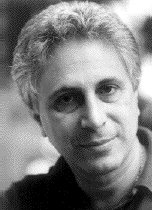 John
Corigliano is internationally celebrated as one of the leading composers
of his generation. In orchestral, chamber, opera
and film work, he has won global acclaim for his highly expressive
and compelling compositions as well as his kaleidoscopic, ever-expanding
technique.
John
Corigliano is internationally celebrated as one of the leading composers
of his generation. In orchestral, chamber, opera
and film work, he has won global acclaim for his highly expressive
and compelling compositions as well as his kaleidoscopic, ever-expanding
technique.
The 1998-99 season introduces Corigliano's revised A Dylan Thomas Trilogy, which takes his three earlier Thomas settings -- Fern Hill, Poem in October, and Poem on his Birthday -- and integrates them into a new setting for baritone and orchestra; the result is an evening-length "memory play in the form of an oratorio," as the composer describes it. Leonard Slatkin leads the work's March 1999 premiere with the National Symphony, at the Kennedy Center and on tour at Carnegie Hall -- continuing a long and fruitful collaboration which in 1996 brought the National Symphony its first-ever Grammy award, for Classical CD of the Year, for its BMG Classics release of Corigliano's Of Rage and Remembrance and Symphony No. 1.
In April 1999, Corigliano's The Ghosts of Versailles receives its European premiere, in a new production directed and designed by Jerome Sirlin to open the new opera house in Hanover, Germany; Andreas Delfs conducts. Commissioned by the Metropolitan Opera, where it premiered in December 1991, the immensely popular Ghosts sold out two engagements at the Metropolitan (1991 and 1994) as well as its 1995 production at the Chicago Lyric Opera. The nationwide telecast of the Metropolitan's premiere production was released on videocassette and laser-disk by Deutsche Grammophon. Following its premiere, The Ghosts of Versailles collected the Composition of the Year award from the first International Classic Music Awards.
In September 1998, the Venice Film Festival opened its festivities with "The Red Violin," for which Corigliano composed his third film score. Esa-Pekka Salonen leads soloist Joshua Bell and the strings of the London Philharmonia in Sony Classical's recording of the soundtrack, which also features the first recording of The Red Violin: Chaconne for Violin and Orchestra, an 18-minute movement for violin and full orchestra introduced last season by Bell with the San Francisco and Boston symphonies. Corigliano's first film score, for "Altered States," was nominated for an Academy Award in 1981; his second, for the British "Revolution," received that country's equivalent -- the 1985 Anthony Asquith Award for distinguished achievement in film composition.
Commissioned by the Chicago Symphony Orchestra when he was in composer-in-residence there, from 1987-90, Corigliano's Symphony No. 1, an impassioned response to the AIDS crisis, captured the 1991 Grawemeyer Award for Best New Orchestral Composition; Chicago's recording of the piece, on the Erato label, won the Grammy awards for both Best New Composition and Best Orchestral Performance. The Symphony has already been played by nearly 100 different orchestras worldwide, and continues to be scheduled by virtually all of the leading U.S. orchestras.
Corigliano first came to prominence after winning the chamber music prize at the 1964 Spoleto Festival for his Sonata for Violin and Piano. Other important commissions have come from the New York Philharmonic (Clarinet Concerto, Fantasia on an Ostinato), Chamber Music Society of Lincoln Center (Poem in October), New York State Council on the Arts (Oboe Concerto), flutist James Galway (Pied Piper Fantasy), and the Boston Symphony Orchestra (Promenade Overture). Recent premieres include Chiaroscuro (1997), a soundscape for two pianos tuned a quarter-tone apart; DC Fanfare (1997), written for Slatkin and the National Symphony; Dodecaphonia (1997), a whimsical song about serialism with a text by Mark Adamo, premiered by Joan Morris and William Bolcom; and the 40-minute String Quartet (1995), commissioned by Lincoln Center for the Cleveland Quartet's valedictory performance. In 1996, the Quartet's recording, like that of the Symphony before it, won Grammy Awards both for Best Performance and again for Best New Composition, making Corigliano the first composer to win twice in the history of that award. Other new recordings include the first recording of Etude Fantasy, by pianist Stephen Hough on Hyperion; a collection of early works released on CRI; and the first recording of Creations for narrator and chamber orchestra, in which Rudolf Werther leads Sir Ian McKellan and I Fiamminghi on Telarc Records.
Born in New York on 16 February 1938, Corigliano comes from a musical family. His father was concertmaster of the New York Philharmonic from 1943 to 1966 and his mother is an accomplished pianist. Corigliano holds the position of Distinguished Professor of Music at Lehman College, City University of New York and, in 1991, was named to the faculty of the Juilliard School. Also in 1991 he was elected to the American Academy and Institute of Arts and Letters, an organization of 250 of America's most prominent artists, sculptors, architects, writers, and composers. In 1992, Musical America named him their first "Composer of the Year."
John Corigliano has received grants from Meet the Composer, the National Endowment for the Arts, and the Guggenheim Foundation. His music is recorded on RCA, Telarc, Erato, New World, and CRI, and published exclusively by G. Schirmer.